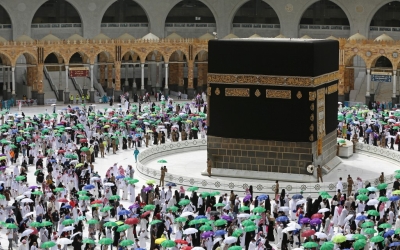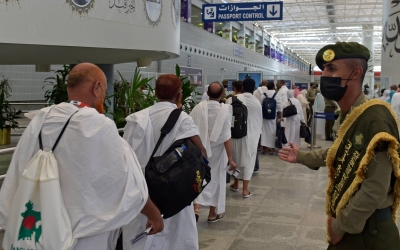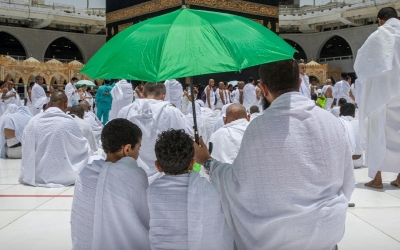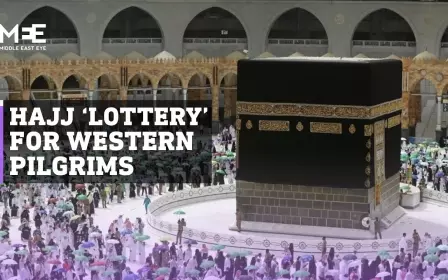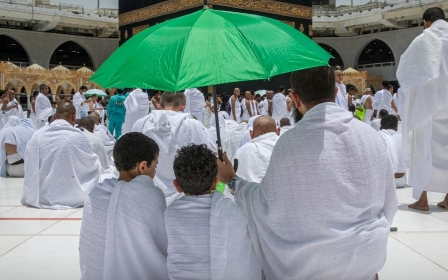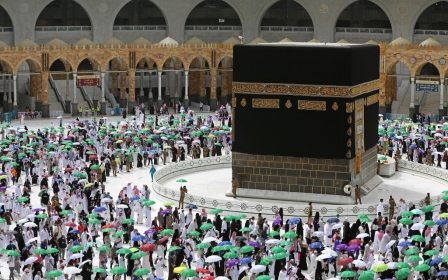US pilgrims and Hajj operators question new Saudi lottery system
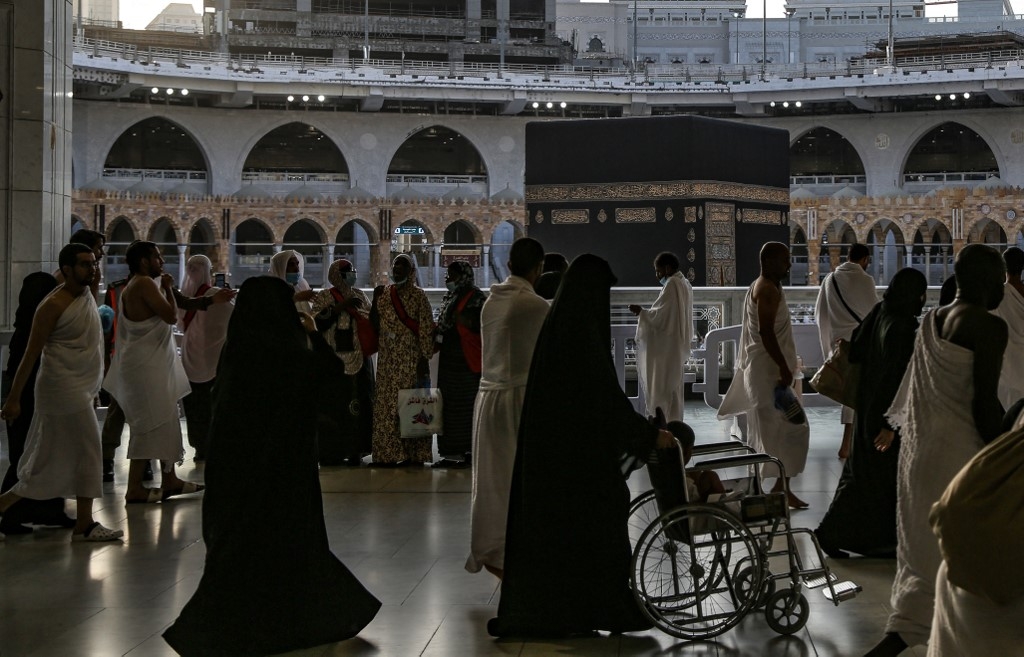
For Amina Suleiman, visiting Mecca is a dream. It is for every Muslim.
She and her husband had been planning on going on Hajj, an annual pilgrimage and one of the five pillars of Islam, since 2019. They pooled their funds together and were hopeful they could go the following year. Then the pandemic hit.
There was nothing they could do but wait. So when Suleiman found out that Hajj was being opened to non-Saudi residents this year, she cried. Her husband quickly reached out to a travel agent in New York, who wasn't taking any deposits yet, as they were still awaiting details from Saudi Arabia regarding quotas.
They handed in their passports and other information to the agent and waited. Suleiman was hopeful. Her mother-in-law was planning on coming from Canada to stay with her son. In the meantime, Suleiman would spend her time watching YouTube videos, teaching her husband how to put on the ihram - a seamless two-piece white garment that aims to nullify differences, such as material wealth, between people.
Then came the news. Earlier this week, Saudi Arabia introduced new rules, which meant prospective travellers from western countries were required to book their Hajj pilgrimage through a government website, rather than via travel agencies.
The kingdom said pilgrims from "Europe, America and Australia" would need to apply via its Motawif website and they would find out next week whether they had gained a place via an "automated lottery".
"My husband called our agent right away and he just said, 'We know just as much as you know'," Suleiman told MEE. "[The travel agent] told us to make dua (pray for the best) and register for the lottery because that is all we can do."
The Hajj is one of the largest religious gatherings in the world. It's considered a religious obligation to be completed during the lifetime of Muslims who are healthy and able to afford it. It consists of a series of religious rituals completed over five days in Mecca and its surrounding areas.
The average Hajj package from the US can cost anywhere from $12,000 to $20,000. Though this is the first time such rules will be implemented in America, a lottery system has already been in use in several countries where there is a Muslim majority, in order to stay within the quota.
In 2019, the kingdom recorded more than 19 million pilgrims for Umrah - a mini-pilgrimage that can be undertaken at any time of the year - and 2.5 million pilgrims for Hajj. According to official data, they contribute around $12bn to the Saudi economy.
The sudden change in the rules just weeks before Hajj have left both prospective pilgrims and travel agents in America confused.
Saudi Arabia's Ministry of Hajj has not said why the changes were made. But it announced that the "lottery" would take place on 13 and 14 June. It has since advised prospective pilgrims to "request refunds from tour operators/agents" who have taken deposits for people wishing to do the Hajj.
"I don't know why the Saudi government is doing this," Suleiman said.
"I am sure it will make it easier and hopefully cheaper, because right now agents have been charging an arm and a leg. But one month before Hajj? They should have done this months before. Or they could have saved this website for next year. What if our name isn't chosen from the lottery?"
The prices for their three packages on the new Motawif website are in fact cheaper, ranging from about $6,000 to $10,000.
'Who will help elderly pilgrims?'
Huzaifa Ismail is in a similar predicament. He had been planning on bringing his parents to Hajj with him this year from Texas. Despite the news, he remains positive.
"Honestly, it's really hard to be upset with this news. I was going to bring my parents to Allah's house. Allah is the one who gets to choose if He wants us invited. If it's not meant to be, then it’s not meant to be," Ismail said. "We should always hope for the best. Maybe this lottery system will be great in the long run."
"I am one of the lucky ones. I didn't pay a deposit yet, my job is incredibly lenient with vacation times so I didn't have to request days off and I don’t have kids," he said.
"I really would like to go complete this pilgrimage that is required of me as a Muslim and I'd like to have my parents do it with me. If not now, then one day."
Mohamed Mahmoud from Amana Travel, an authorised Hajj and Umrah agency based in Brooklyn, hopes the Saudi Ministry of Hajj will change its mind and instead enact the new lottery system next year.
He explained that the Hajj is not an easy process and that the Saudi government's attempt to simplify things might complicate them.
"Most people are elderly and women. Some don't speak English. They will need someone to guide them," Mahmoud said.
"I don't know how they will do it with this platform. Will they combine people together like we do? We would put people who speak the same language together in camps. Will they do that?"
Nearly all of the Hajj operators MEE spoke to said they offered tour guides in a variety of languages to accommodate elderly pilgrims that do not speak English.
So far, Amana Travel took deposits from 50 people planning on going on the Hajj pilgrimage. After Ramadan, they stopped taking deposits and would instead just take passports, because nothing was confirmed by the Hajj Ministry, he explained.
"This year, the ministry told us we could only take 40 to 50 percent of the quota, but they never gave us an exact number," he said. "We prepare for Hajj three to four months in advance. But the Saudi government is asking people to prepare in less than one month."
"This is our business. They cut off our business suddenly without any notice. This is not good."
As of now, his phone has been swarmed with calls from prospective pilgrims asking about the new process. He has not yet given back the refunds to those who already paid a deposit. Instead, he's asking them to wait a week, just in case something changes.
'This decision must be reversed'
According to a spokesperson at Labaik Tours, a travel agency based in Virginia, the new rules could put Hajj operators out of business.
“It is a very bad last-minute decision of Saudi Arabia. They have put all travel agencies involved in Hajj service completely out of business and left the people who already booked with them in a major chaotic situation,” they said.
“This is discrimination against non-Muslim countries that do not have government-supervised Hajj missions. We feel that we have been robbed overnight and lost our business and came into a huge financial crisis. This decision must be reversed.”
On the other hand, Imam Rajab Zandolu, from Hisar Tours in Clifton New Jersey, said it was still too early to pass judgement on the new system.
"I believe there could be some advantages and disadvantages, but we are still awaiting more details," he said.
Hisar Tours has been arranging Umrah and Hajj packages since 2013. Zandolu says Hisar is more of a service to the US congregations of 25 mosques on the east coast that hope to fulfil their religious obligations.
"It’s a service we provide our community. It's not something we derive an income from," Zandolu said.
Zandolu said the old system benefited the companies that were in the business for many years and it was difficult for new companies to break in and access Hajj quotas. He says perhaps the new system will alter this balance and allow companies to provide other types of services.
Haroon Hasan, the general manager at Ainul Haramain Travel, which has been serving people for 16 years, feels the same way.
"The least of our worries is financial loss. Our focus is to make sure we can help fulfil a religious obligation for the American Muslim community. Less than a month is left and many community members with the intention of performing Hajj do not know if they will be able to afford Hajj, how the services will work, when will they travel to Saudi or back, and [whether or not they] should they apply for vacation."
MEE reached out to the Saudi Ministry of Hajj for comment but did not receive a response by the time of publication.
Middle East Eye propose une couverture et une analyse indépendantes et incomparables du Moyen-Orient, de l’Afrique du Nord et d’autres régions du monde. Pour en savoir plus sur la reprise de ce contenu et les frais qui s’appliquent, veuillez remplir ce formulaire [en anglais]. Pour en savoir plus sur MEE, cliquez ici [en anglais].


